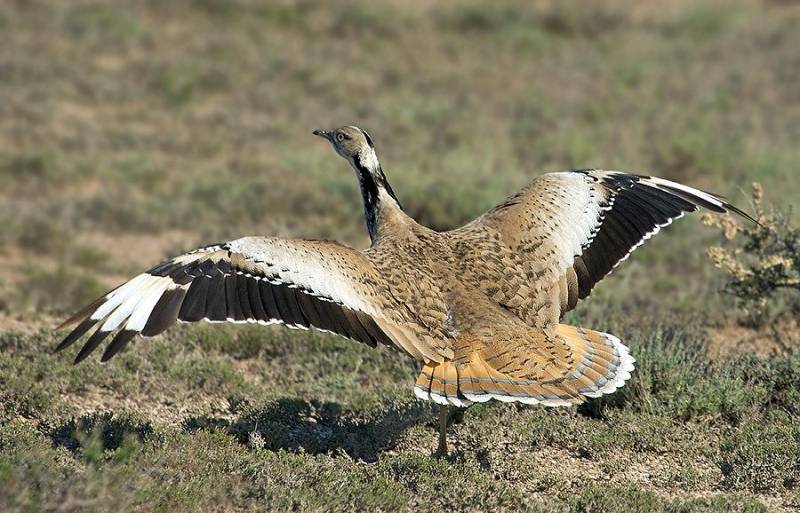Although our country’s wildlife department is not famous for sporting any moral principle, yet a rare exception is Mr. Jaffer Baloch, the former divisional forest officer of the Balochistan Forest and Wildlife Department of Chagai, a post from which he was transferred. The reason: he revealed that in January 2014 Fahd bin Sultan bin Abdul Aziz Al-Saud, the governor of the Tabuk province of Saudi Arabia, had killed 2100 houbara bustards in the remote areas of Balochistan’s Chagai District. The governor of Tabuk, Saudi Arabia (Fahd) was using a fake permit, which was illegally manufactured by the Foreign Ministry that has no authority furnish people with such permits.
“For preparing my report about the exact figure of the birds killed in Chagai, which was leaked to the Press, I was transferred from my post,” Mr. Jaffer Baloch had told Ali Raza Rind, who is a journalist based in Dalbandin, the headquarters of Chagai.
In recent years, the Foreign Office had allocated certain areas of Balochistan, including District Zhob, Ormara and Pasni, Disrict Gawadar, District Kharan (excluding Nag Dera breeding area), District Panjgur, District Washuk, District Khuzdar, District Lasbela, Tehsil Lehri of District Sibi, old Katchi and Sani Shoran of District Bolan, District Kila Saifullah, including Kar Khurassan (less subdivision Muslim Bagh) and Samungali, to the dignitaries of the United Arab Emirates (UAE) for the hunting of houbara bustards in 2013-2014. But due to the furore generated in the national and international media after the killing of 2100 houbara bustards in Chagai District in November 2014, the Balochistan High Court (BHC), the highest court in the province, directed subsequently that the provincial government of Balochistan, led by Doctor Abdul Malik Baloch, cancel the allocation of areas to the Arab dignitaries.
However, according to media reports, 29 foreigners have been granted the license to hunt houbara bustards in the past few years, who are some of the most influential men of the Gulf region.
“Despite the ban on hunting the endangered Houbara bustards, Arab dignitaries – who were Sheikh Suroor bin Muhammad Al-Nayan and Sheikh Saif Zahid Al-Nayan of the United Arab Emirates – landed at the Panjgur airport at the end of January,” says Barkat Jeevan, who is a stringer based in Panjgur District of Balochistan. “They camped in the remote areas of Panjgur for a week, hunting a hundred birds.” When asked about the exact number of birds killed in Panjgur during their visit, Jeevan said it was kept secret due to the fear of media.
A resident of Panjgur informed on the condition of anonymity that the Arab Sheikhs were welcomed by the Provincial Health Minister of the ruling National Party, Rehmat Saleh Baloch. He further added that he was taken to his camp with the heavy contingent of the Frontier Corps (FC) and the Police.
“In one of the remote areas of District Panjgur, Peer Omer Jan, Arab Sheikh called Sheikh Saif Muhammad bin Al Nayan has built a residential house,” says Jeevan, he further adds, “This time, he did not come. Instead of him, his relatives Sheikh Suroor bin Muhammad Al-Nayan and Sheikh Saif Zahid Al-Nayan came to Panjgur for hunting the houbara bustards.” He also said that the local community of Panjgur was unhappy over the visit of the Arab Sheikh, as he was violating the law by hunting the bustards.
Furthermore, locals of Musakhel District also confirmed that Qatari Sheikhs had been hunting the migratory birds in their areas, and would hunt 6 to 12 birds on daily basis.
Unlike Panjgur and Musakhel, when Saudi Arabia (Fahd) in February landed at Dalbandin airport, it again gained critical attention in the media. “Ironically, our own Federal Minister Ahsan Iqbal welcomed him at Dalbandin for violating national laws, as the hunting of houbara bustards is banned by the highest court of the province,” said Noor Ahmad, who is a rights activist based in Quetta. On the other hand, the forest and wildlife advisor to the Chief Minister of Balochistan, Obaidullah Jan Babat said, “Arab dignitaries are visiting development sites; they are not hunting in Dalbandin.”
But a source from Dalbandin informs us that there were no development sites in Bartagazai areas of Dalbandin, where the Arab dignitaries had camped.
“To appease the local populations, where Arab dignitaries hunt, they have built hospitals, roads, and mosques,” say local reporters.
Ali Raza Rind said, “In the past, the governor of Tabuk built a gigantic and beautiful hospital and mosque by issuing funds to the governmental authorities.” But he also refuted the claim that he had come to visit the development sites in Dalbandin.
The Houbara bustard is listed as vulnerable on the International Union for Conservation of Nature’s Red List of Threatened Species.
According to the code of conduct, the hunting period is restricted to 10 days with a bag limit of 100 birds. Hunters have been advised to neither poach chicks or eggs, nor hunt live bird. They are also ordered not to use firearms for hunting, which is to be carried out only using falcons. But Quetta-based conservationists say that they never follow the code of conduct. They further ask: how can you stop the Arab dignitaries from using firearms during hunting? Will they listen?
There is no denying the fact that Pakistan possesses warm relations with the United Arab Emirates, Qatar and Saudi Arabia. Prime Minister Nawaz Sharif is particularly close with Saudi Arabia, where he spent nearly seven years in exile after former military chief Pervez Musharraf toppled him in a coup. That is why, according to media reports, it is stated that the Prime Minister Nawaz Sharif himself sent his Federal Minister Ahsan Iqbal to welcome Saudi Arabian governor, Fahd. This is why Arab dignitaries fearlessly break the law and hunt the houbara bustards of Balochistan – every winter.






